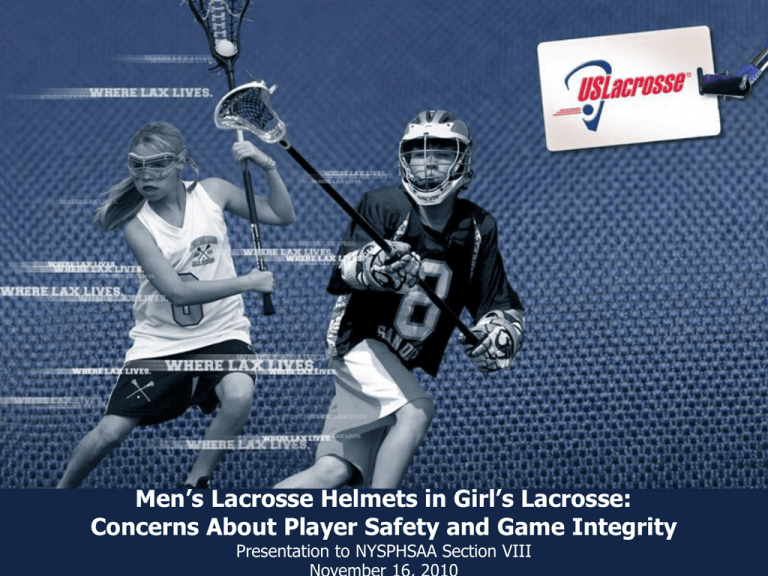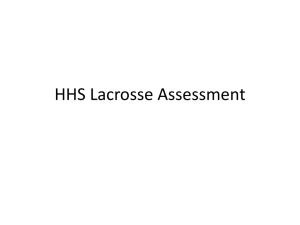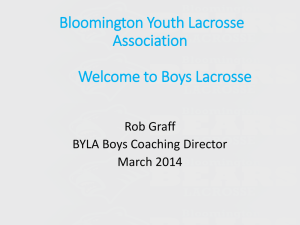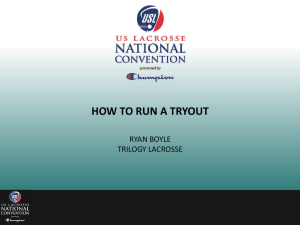Headgear Presentation (Powerpoint)
advertisement

Men’s Lacrosse Helmets in Girl’s Lacrosse: Concerns About Player Safety and Game Integrity Presentation to NYSPHSAA Section VIII Men’s Lacrosse Helmets in Girl’s Lacrosse: Concerns About Player Safety and Game Integrity US Lacrosse Presentation to NYSPHSAA Section VIII November 16, 2010 Steve Stenersen, President and CEO Ann Kitt Carpenetti, Managing Director of Game Administration Overview of US Lacrosse • National governing body of men’s and women’s lacrosse • Staff of 65 headquartered in Baltimore • Representative board, committee and subcommittee leadership structure • 320,000 members, 62 regional chapters across 40 states • Provides comprehensive leadership, programs and educational resources focused on the responsible growth of lacrosse US Lacrosse Sports Science & Safety Subcommittee Established as an advisory group to US Lacrosse Serves as a source of lacrosse-specific safety education Chaired by Dr. Margot Putukian, Dir. of Athletic Medicine at Princeton Comprised of more than a dozen researchers and doctors representing various medical specialties • Represents US Lacrosse at various medical conferences • • • • Subcommittee goal: to utilize the existing sports medicine literature, and grow the body of lacrosse safety knowledge, in order to objectively advise US Lacrosse on factors that may enhance the safety and quality of experience in men’s and women’s lacrosse. SS&S Subcommittee Focus • Injury Data Collection – Fairfax County (VA) Public Schools – Maryland Youth Lacrosse Association – MedStar Sports Health – NFHS – NCAA • Commotio Cordis – Acompora Foundation (education) – Cardiac Science (AED education and grants) – NOCSAE (development of a chest protector standard) SS&S Subcommittee Focus • Collaboration – NATA (Youth Sports Safety Alliance) – AOSSM (Sports Trauma & Overuse Prevention) – USADA – Supplement Safety Now – USOC – Working Group for Safe Training Environments – Sport-Related Traumatic Brain Injury Research Institute (pending) • Measuring head impact force using helmet accelerometers SS&S Subcommittee Focus • Concussion – American College of Sports Medicine (education) – Centers for Disease Control & Prevention (education) • Online toolkit, training & poster • http://www.cdc.gov/concussion/HeadsUp/online_training.html • http://www.cdc.gov/traumaticbraininjury/ – DVD Production (education) – Neurocognitive Baseline Testing (ImPACT and others) – NOCSAE (women’s headgear standard) – NCAA & NFHS (rules) • How to Hit Video Overview of Men’s and Women’s Lacrosse Injuries • Overall, lacrosse is a moderate risk sport; the vast majority of injuries are minor strains, sprains and bruises. • Non-contact ankle and knee ligament sprains, sustained while cutting and dodging, are most common: girls (21%); boys’(16%) • Knee injuries, including ACL tears, are the leading cause of lost game and practice time in both games • Head and face injury, including concussion, are less frequent but an important issue for both games – Body-to-body or body-to-ground contact in the boys’ game – Inadvertent stick- or ball-to-head contact in the girls’ game – More frequent in game than practice What does Current Concussion Research Tell Us? • NFHS, High School Sports Related Injury Surveillance Study • NCAA Injury Surveillance System, DATALYS • National Center for Catastrophic Sports Injuries • US Lacrosse – Trends in Sports-Related Concussion Incidence at the High School Level, 1997-2008 Related US Lacrosse Initiatives • US Lacrosse Medical Conference - Baltimore – Friday, March 11 (prior to Face-off Classic) • Sport-specific Coach & Official Education/Certification – Essential to a safe lacrosse experience • Parent Education – Best-practices for youth lacrosse experience • Standardized Youth Rules – Based on physical & cognitive development stages – Safe play standards for tournaments 2011 US Lacrosse Research Priorities • Interventions/pilot studies related to concussion – Education (officials, coaches, parents, players), rules, equipment – Head acceleration in boy’s and girl’s lacrosse – Focal impact of stick-to-head contact in girl’s lacrosse • US Lacrosse coaching education curricula effectiveness • Effect of regional variability in level of play on game safety • Developmentally appropriate practice/game frequency by age – incidence of overuse injuries, acute injuries, and burnout • Concussion/head injury/facial injury summary across both games and all levels of play US Lacrosse Concerns About the Use of Men’s Lacrosse Helmets in Girl’s Lacrosse Women Lacrosse and Men’s Lacrosse are Two Distinct Versions of the Sport GIRL’S RULES BOY’S RULES CONTACT Aggressive stick checking and body contact are illegal Aggressive stick checking & body contact are legal EQUIPMENT Shallow pocket rule allows for easier ball dislodgement Deeper pocket rule requires more aggressive checking Protective eyewear and mouth guards are required Mouth guards are required Soft head gear and nose guards are optional NOCCSAE-approves men’s helmets are required Close-fitted gloves are optional Arm pads, shoulder pads and heavy gloves are required Current NOCSAE Lacrosse Helmet Standards Were Developed Specifically for Men’s Lacrosse • Designed for a collision sport • Based on football helmet standard and testing (drop test) • Designed to prevent catastrophic head injury (skull fracture) • Only three recorded catastrophic head injuries in women’s lacrosse over 27 years • • Two eye (pre-eyewear mandate) One c-spine Helmets Do Not Eliminate the Risk of Concussion Q&A with Dr. William Meehan Director of the Sports Concussion Clinic at Children’s Hospital Boston Boston CBSlocal.com October 26, 2010 “Helmets will not decrease the risk of concussion (in girl’s lacrosse). In fact, they’ll probably increase it a little bit,” says Dr. William Meehan. “It’s due to a rapid spinning or rotational acceleration to the brain. So if you put a helmet on and somebody hits you in the jaw of the face mask, your head is going to spin, and the helmet is going to spin with it, but you’re not going to reduce the risk of that rotation.” Q: Even if helmets don’t prevent concussions, they do protect against catastrophic head injuries. So why not require the girls to wear helmets for that reason? A: “In the medical literature I didn’t see one case of catastrophic brain injury to a woman,” says Dr. Meehan. In addition, some people are concerned that if girls wear helmets, the level of aggressiveness will go up actually leading to more concussions. That’s why Dr. Meehan doesn’t advocate helmets for the girls. “Personally I think the price of the increased number of concussions would be too much to pay,” he says. Women’s Lacrosse Rules Have Long Allowed Soft Headgear US Lacrosse 2010-11 Rule Changes: Increased Penalties for Dangerous Play Rules continue to evolve and focus on player safety. Major changes in the women’s game were recently made to Rule 7, Misconduct and Suspensions: • The head coach is now responsible for the behavior of her/his team, including assistant coaches, and will receive any cards related to bench decorum. • Anyone receiving two yellow cards in a single game is required to sit out of the team’s next game. • High school players who receive a red card must sit out of the team’s next two games. Youth players who receive a red card as a result of a check to the head are required to sit out team’s next game. • Once a team receives three red cards in any game, it will play shorthanded for the remainder of the game…and will lose an additional player each time another card is received. Case Study Massachusetts Interscholastic Athletic Association 1986-1996 • The MIAA mandated ice hockey helmets for girl’s public high school play starting in 1986 • After ten years, the MIAA overturned its decision for two primary reasons: – Concern over increased injuries caused by a more aggressive style of play – The threat of litigation from parents whose daughters were not being recruited by colleges as a result of the helmet mandate Headgear Designed Specifically for Women’s Lacrosse US Lacrosse is now working with NOCSAE and the lacrosse equipment industry to create a headgear standard specifically for the rules and culture of women’s lacrosse. Men’s Lacrosse Helmets Were Not Designed for Women’s Lacrosse It would be irresponsible and potentially dangerous to require girls’ lacrosse players to wear a helmet designed specifically for the rules, style of play, culture and mechanism of injury of a completely different game. Men’s lacrosse helmets were designed to prevent catastrophic head injuries in a collision sport, but there has been no evidence of catastrophic head injury in women’s lacrosse since 1982. Such a decision would also ignore the potential of unintended consequences to player safety and game integrity. Equipment intervention decisions should be based more on empirical data analysis than emotion. Recommendations Collaborate with US Lacrosse ongoing Consult with women’s lacrosse and concussion experts ongoing Encourage Section VIII schools to participate in NFHS/RIO research Educate coaches, players and parents about concussion and returnto-play guidelines following injury. When in doubt, sit it out! • Require all coaches to be US Lacrosse-certified to assure that they have received proper game-specific training • Require all officials to be US Lacrosse-certified to assure that they have received proper game-specific training • Do not mandate men’s lacrosse helmets for girl’s lacrosse – wait until a NOCSAE standard for women’s lacrosse is established. • • • • Questions? Thank you!





